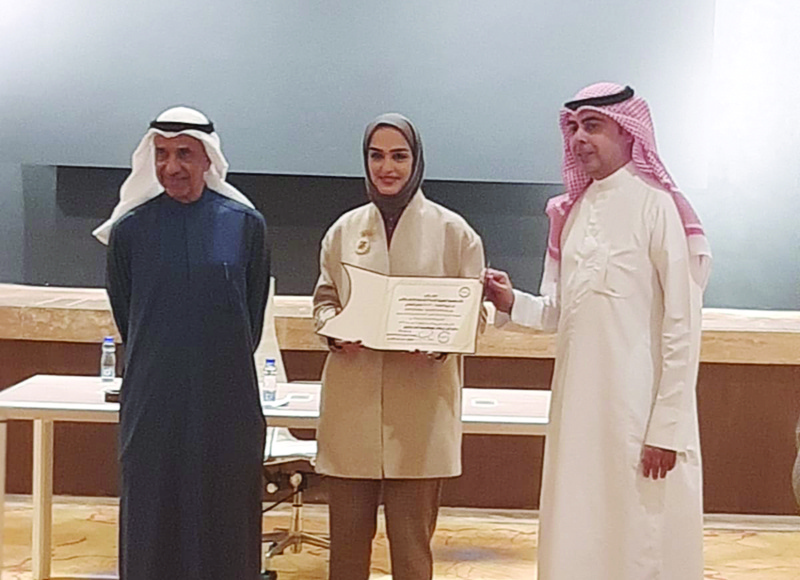 KUWAIT: Hanadi Ashkanani, Head of the Social Service Department at the Addiction Treatment Center (center), is seen during the vent.
KUWAIT: Hanadi Ashkanani, Head of the Social Service Department at the Addiction Treatment Center (center), is seen during the vent.
By Nawara Fattahova
KUWAIT: Kuwait Social Service Society (KSSS) held a lecture on 'Misconceptions among the family of the addict' on Saturday. Hanadi Ashkanani, Head of the Social Service Department at the Addiction Treatment Center (ATC), presented a very interesting lecture on drug addicts and their families.
According to her, drug addiction is a chronic, degenerative disease which can lead to death. It cannot be cured, but can be controlled. "At ATC, we provide rehabilitation treatment for six months to two years depending on the case. In order to stop drug addiction, the addict should surrender themselves to the center. The international addiction treatment consists of 12 steps, but each step may differ in duration - some addicts spend one month on the first step, while others spend a year on the same step. Addicts should follow the treatment their entire lives," explained Ashkanani.
Losses caused by addiction differ from one person to another. "Some addicts have lost everything and sleep outside the door of our center, while others are still working normally and living with their families. I even saw an addict who is still working as a paramedic driving an ambulance, which I consider very dangerous," she added.
"Some addicts come to our center just to prove to their families that they have stopped their addiction in order to get married. It's not true that all those who enter ATC for treatment will stop being addicts forever. An addict who has stopped is different from a recovering addict. Their parents should recognize this and stop providing them all the advantages as in the past. If the addict isn't recovering, they can't control their emotions and will abuse drugs again," Ashkanani pointed out.
Family support group
ATC holds a family support group meeting every Tuesday. "The family members of the addict can come to get information on dealing with their children. They will remain anonymous. The first step of dealing with the addict is to take the decision to confront them and bring them to the center. If they refuse, the family should report them to the police, who will bring them here. Unfortunately, some families take the addict to a private clinic that only replaces the drugs with medicines - the person is still an addict but on a different substance," she said.
Some addicts think that after spending six months at ATC, they have recovered. "The addict should not decide to leave the center by themselves. Recovered addicts are the best people to help other addicts, as they can freely speak with them about their mistakes. Every Thursday, we have an activity at ATC called 'holding a message' as part of the 'Together we can' program. Only addicts can attend it, where ex-addicts encourage those who join the center to stop their addiction," stressed Ashkanani.
The most important fact for the addict is to admit that they have a problem with addiction and drugs, otherwise the result will be zero. "For addicts who don't wish to stay at the center and insist to leave, we have to let them go to prevent other addicts from being negatively affected. In the past, some residents of the center smuggled drugs inside the center, so we rebuilt rooms with lower walls and less privacy to make it easy for staff to maintain control," she said.
Better response
Ashkanani also provided some statistics, such as male addicts respond to treatment better than women. "Some new drugs such as chemical and crystal meth are becoming worse and worse. These are manufactured locally from dangerous materials such as cleaning products, battery fluid and others. Some drugs, especially crystal meth and chemical, do not appear in tests, while some pills of other drugs stay in the body for a month. Also, the number of addicts has visibly increased after the pandemic," she said.
From 2015, ATC separated from the psychiatric hospital. It's still a government institution and treats both citizens and expats, but foreigners pay similar fees as in public hospitals. There are three wards at the center, and each has between 35 to 40 beds. ATC also has another building in Fintas. Dr Ali Al-Thafiri, Chairman of KSSS, said the society provides various services to improve the services of social specialists at all institutions. "I hope officials in charge will pay attention to this profession. We spread awareness in the community by providing our services to various ministries such as education, health, social affairs, awqaf, interior and others," he told Kuwait Times.
.jpg)



